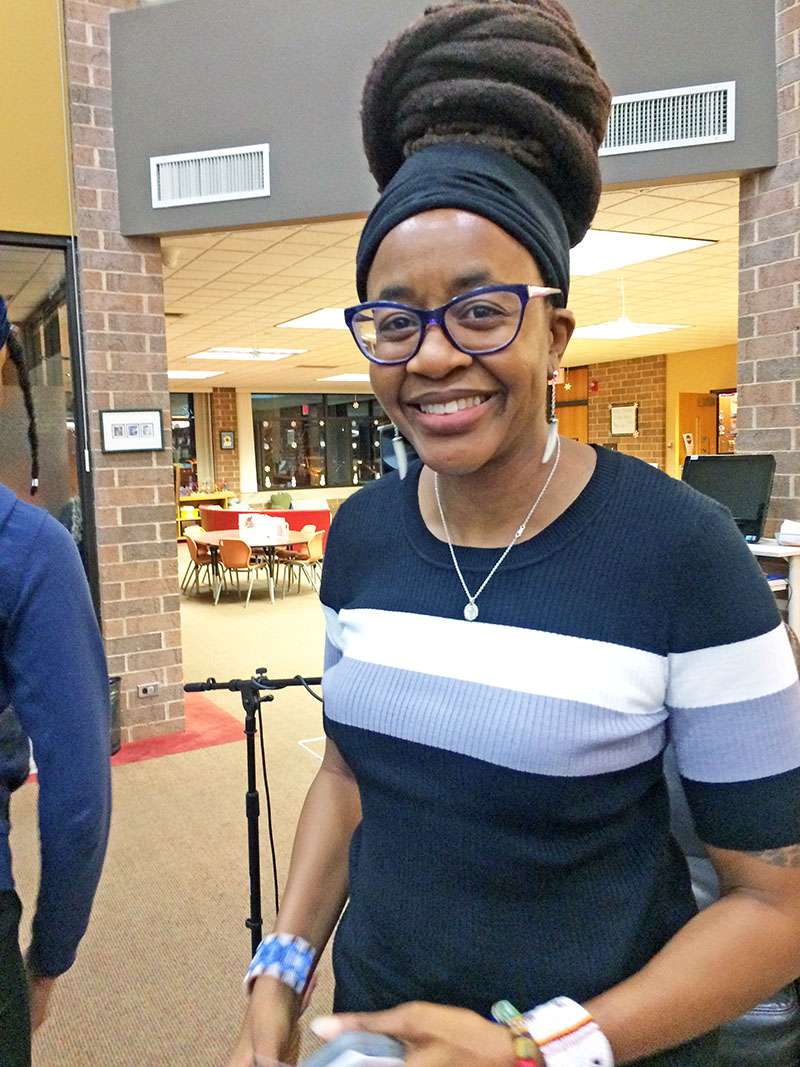Nnedi Okorafor loves creating imaginary worlds. Her latest project is helping create the imaginary African country of Wakanda for Marvel’s Black Panther series.
“With Black Panther, I like to look around Wakanda through his eyes. Parts of writing within that universe is I finally got him to see Wakanda,” she told nearly 100 people who gathered at the Homewood Public Library Jan. 11 for her guest author visit.
Nnedi Okorafor loves creating imaginary worlds.
Her latest project is helping create the imaginary African country of Wakanda for Marvel’s Black Panther series.
right, a librarian at the
Homewood Public Library,
asks a question of author
Nnedi Okorafor during her
presentation Jan. 11.
(Marilyn Thomas/
H-F Chronicle)
“I felt like the story was always focusing on the royals (Black Panther and his immediate family who escaped colonialism). I wanted to see how Wakandans live. I wanted to get really close in terms of the wildlife, in terms of the trees, looking at vibranium,” the metal that gives Black Panther his super-human abilities.
“With Black Panther, I like to look around Wakanda through his eyes. Parts of writing within that universe is I finally got him to see Wakanda,” she told nearly 100 people who gathered at the Homewood Public Library Jan. 11 for her guest author visit.
The Homewood-Flossmoor High graduate said her comic strips are very detailed. She writes the story and gives illustrators specific details of what should be said and what the activity is in each panel.
Before writing “Black Panther: Long Live the King” and a comic book series for “Shuri” the techno-wizard sister of Black Panther, Okorafor had an international reputation as a science fiction author and writer of Afrofuturism. She writes for adults and teens. Her work has won numerous honors, including the Wole Soyinka Price for Literature in Africa for “Zahrah” and the 2011 World Fantasy Award for best novel for “Who Fears Death.”
It was an unfortunate medical emergency that indirectly got her into a writing career. She was planning to be an entomologist when life threw her a curve ball.
She’d played competitive tennis since she was 9, and was on the tennis and track teams at H-F. The years of activity took a toll on her back, and the scoliosis in her spine worsened. Over summer break between her freshman and sophomore years at the University of Illinois at Urbana-Champaign, she underwent back surgery. When she awoke, she was paralyzed from the waist down.
“What I was known for in this area was my athletics, and then this thing happened to me,” she recalled. “There was a shock on so many levels. It was like losing your identity. It was a shock to my system spiritually, mentally, physically, all that. That was the moment that something had to click because it was a dark moment. You can’t take an athlete who can run faster and jump higher and then be paralyzed.
“Laying in that hospital I had to do something and I had to use my mind, and that was when I started writing stories,” she said. “That was the beginning of so much, because before that I’d never written anything previously. I read a lot, spent lots of time in the (Flossmoor) library. I consumed books like candy. I always loved stories, but I never thought to make one up myself.”
Okorafor’s stories draw on her American home and Nigeria, her parents’ homeland. They would take their four children to Africa for holidays and Okorafor got to meet her extended family. She shares both worlds, although she says it often leaves her feeling incomplete and different.
“I’ve had to learn to accept being that. In terms of being American, I like to call myself Nijiamerican, taking the two cultures and blending them into one word that can’t be torn apart. That’s why I like that term, because it’s something else entirely. It’s something that belongs and doesn’t belong and I’m fine with that,” Okorafor told the audience.
She writes from that world because it is what she knows. Okorafor said she wrote for eight years as she continued her schooling and went through therapy to regain her ability to walk. A professor suggested she try and get a story published. She started pursuing a writing career and when she did share her stories they were often rejected because the characters couldn’t be classified or the story line was judged to be neither science fiction nor fantasy.
“I wasn’t whitewashing my characters. I put them out the way I wrote them, on my own terms,” she said.
Okorafor encourages others to write.
“Do it, don’t talk about it. Writer’s block is a myth,” she said. “You don’t have to write every day,” and you don’t have to write a story in sequence.
Audience members gave Okorafor a hearty round of applause after her nearly two-hour presentation.
“I thought Dr. Okorafor was genuine and she drew us in to a story and made me want to read a genre that’s not my favorite,” said Andrea Denney of Flossmoor who planned to buy Okorafor’s books for her kids.
Alice Snyder of Hazel Crest said, “I was thoroughly intrigued, and she’s a fascinating person. Her imagination is just out of this world.”

